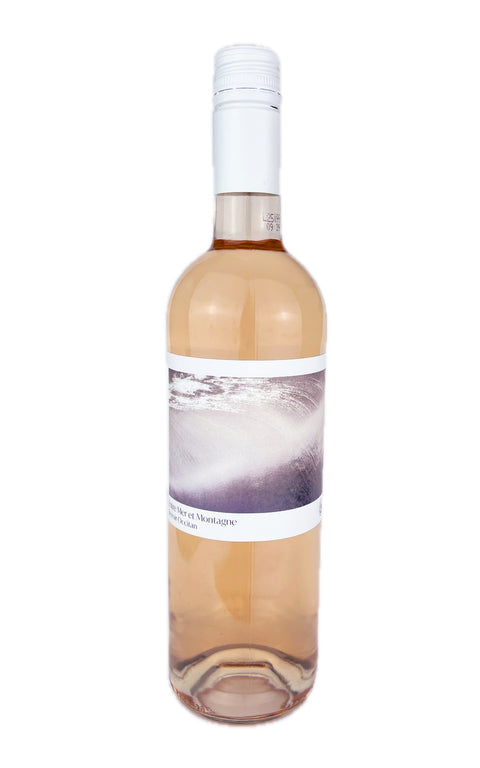
Christophe Muret Entre Mer et Montagne Rose Languedoc France
LUTTE RAISONEE / SUSTAINABLE / ROSE WINE / FRANCE
A dry, approachable and elegant rosé with juicy wild strawberry, citrus, and herbal notes, lifted by freshness from the coastal and mountain influences. It’s a crisp, expressive Southern French rosé that’s easy to love and even easier to drink.
- Origin: Languedoc, France
- Producer: Christophe Muret
- Vintage: 2024
- Grape varieties: Cinsault, Syrah
- Food pairings: Aperitif, grilled meats and goat cheese.
- Bottle size: 75cl
- ABV: 12%
Flavour profile
Delicate and vibrant, this rosé bursts with notes of wild strawberries, citrus peel, and a hint of fresh herbs. On the palate, it’s crisp and refreshing, with soft red berries, a touch of minerality, and a clean, dry finish. There's lovely lift from the cool mountain breeze, balanced by ripe fruit from the sun-drenched vineyards.
About Christophe Muret
Christophe Muret is one of our favourite producers—reliably crafting high-quality, great-value wines from the South of France. His approach is sustainable and deeply respectful of the grapes and the surrounding terroir. The vineyards for this cuvée sit between the Mediterranean Sea and the mountains, with the fierce Tramontane wind sweeping through to bring freshness and structure to the wines.
About the Languedoc region
Languedoc is one of France’s most dynamic and diverse wine regions, known for its sunshine, coastal influence, and rugged hills. Long considered a source of bulk wine, it’s now home to an exciting wave of independent winemakers who are producing characterful wines with a sense of place; especially fresh, fruit-forward rosés like this one.
How to pair it
Perfect with fresh salads, grilled vegetables, seafood, light pasta dishes, or just on its own as a relaxed apéritif. It’s a great match for picnics, barbecues, or late lunches that drift into the evening. Serve chilled.
Delivery and returns
What are the delivery options?
- Local Delivery (E17, E10 postcodes): Free over £35
- Click & Collect: Free
- Standard Delivery: £8.95 (Free over £80)
Where can I get my order delivered?
- Local Delivery is available within London E17 and E10 postcodes.
- Click & Collect orders can be picked up at our shop located at 149 Forest Rd, E17 6HE.
When will my order arrive?
- Next day service is available for local and standard deliveries (subject to availability).
- All orders placed by midnight will be dispatched the next working day.
Why do I need to pay for returns?
- If returning your order by mail, the buyer is responsible for the return shipping cost.
- You may return your purchase within 30 days if you are unsatisfied for any reason.
How do I return my order?
- Free returns are available if you return your order to our store.
- If returning by mail, you may ship back the item using the carrier of your choice.
Frequently Asked Questions
What kind of wine is Languedoc?
Languedoc is a large and diverse wine region in the South of France, known for producing great-value reds, whites, and rosés. You'll find everything from light, fresh styles to bold, structured wines, often made with Mediterranean grapes like Grenache, Syrah, Carignan, and Mourvèdre.
Is Languedoc wine dry?
Yes, most wines from Languedoc, especially the reds and rosés, are dry. Thanks to the sunny climate and winemakers' focus on freshness, they often have ripe fruit balanced by good acidity and a clean, dry finish.
What is a French-style rosé?
French-style rosé usually means a dry, pale pink wine with delicate fruit, good acidity, and subtle herbal or mineral notes. These wines are typically light, elegant, and food-friendly, especially those from Provence and Languedoc.
Is French rosé sweet or dry?
Most French rosé is dry. Regions like Provence, Languedoc, and the Rhône Valley specialise in making crisp, refreshing rosés that are bone dry or have only the slightest hint of fruit sweetness.
What is lutte raisonnée?
Lutte raisonnée (literally "reasoned struggle") is a sustainable farming approach in viticulture. It means using organic methods as much as possible, but allowing limited use of treatments when absolutely necessary. It's all about reducing chemical use while staying pragmatic and protecting the health of the vines.